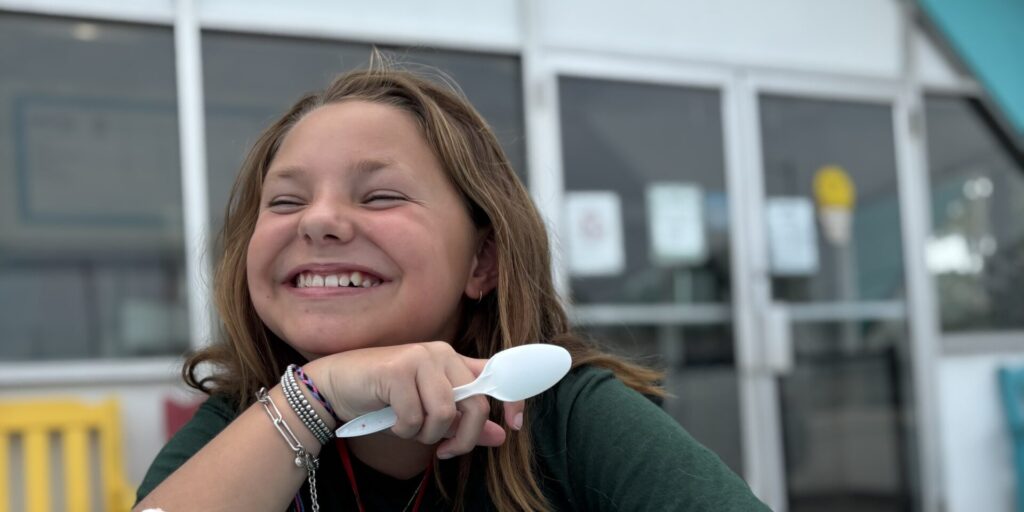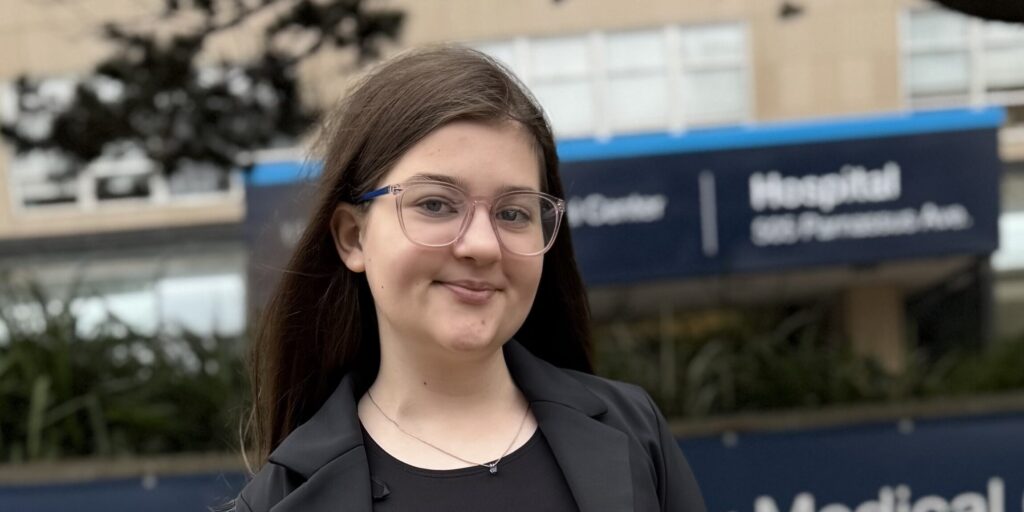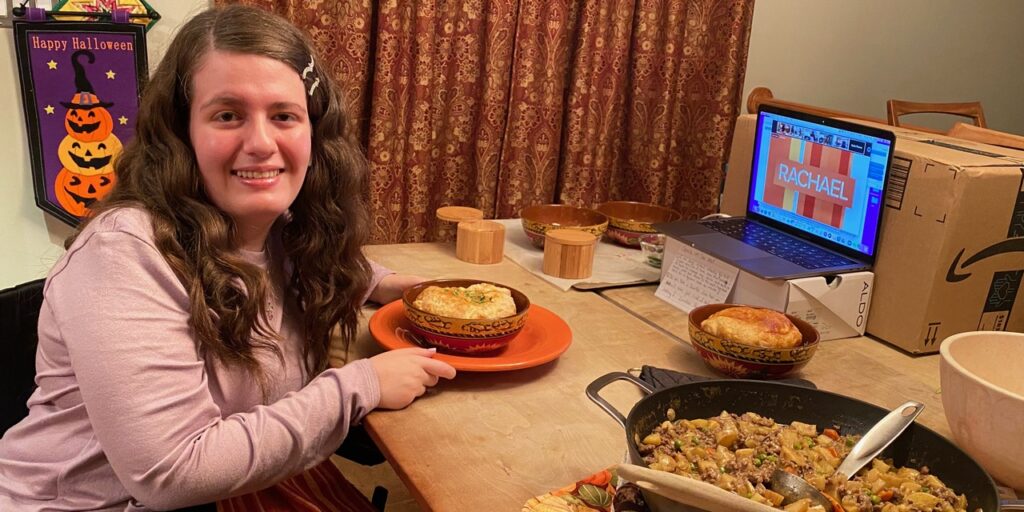
Cooking with a Disability? Yes, Chef!
By Barbara and Jim Twardowski, RN | Monday, October 20, 2025
Growing up as a full-time wheelchair user living with myofibrillar myopathy (MFM), 21-year-old Gabby DiSalvo always considered the kitchen an inaccessible place. But when the COVID-19 pandemic started while she was in high school, and she was stuck at home, Gabby tried cooking to pass the time.
Creating recipes and learning how to cook soon consumed her days. “I was cooking so much that I fell in love with it,” Gabby says. During one sleepless night in 2020, Gabby realized that starting a blog was the perfect opportunity to share her love of cooking and advocacy. She even thought of a name: Cooking on Wheels.
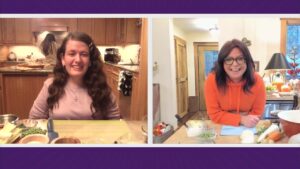
Gabby appeared virtually on the Rachael Ray Show to demonstrate adaptive cooking.
“I was already sharing most of my recipes with friends and family, and I was like, I might as well start posting them,” says Gabby, who now has fans on Instagram, TikTok, and Facebook.
At the age of 16, Gabby fed her newfound passion by taking online classes through the Food Network’s New York City Wine & Food Festival. During the virtual lessons, Gabby had the chance to submit questions to daytime TV talk show host Rachael Ray, who was one of the instructors. In 2020, when the Rachael Ray Show celebrated its 2,500th episode, she invited Gabby to appear on the show remotely. In 2023, Gabby made another virtual appearance on the Rachael Ray Show, this time from the University of Connecticut (UConn), where she was a freshman.
The exposure Gabby garnered from the television appearance and her social media led her to teaching cooking classes. She’s taught classes open to the community at College of Staten Island in New York and provided virtual instruction to adults with developmental disabilities in Canada.
Now a senior at UConn, Gabby is majoring in Disability Studies in Media and Food Culture and hosts a cooking show on the student-run television station. She is the first student with a disability to have a show on UCTV. (Watch episodes at youtube.com/@TheUCTVchannel14.)
Gabby also works as a kitchen assistant at UConn, which gives her the opportunity to learn from culinary professionals and gain valuable experience in a professional kitchen.
Gabby’s adaptive cooking hacks
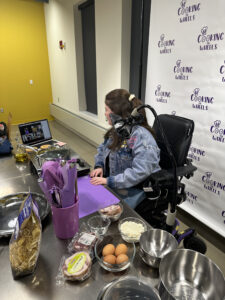
Gabby and hosts a cooking show on her college TV station.
MFM causes weakness throughout the body, and Gabby’s muscles are approximately 16 times weaker than those of an average adult. Fortunately, Gabby knows that a chef doesn’t have to do 100% of the work themselves and it’s OK to ask for help. For example, if she needs to use a heavy pot, she doesn’t hesitate to ask someone to lift it for her.
 Gabby chooses mobility equipment to fit her kitchen environment. When she needs to maneuver in tight spaces, she uses a compact manual wheelchair. In roomier kitchens, she uses her power wheelchair with an elevating seat, which gives her a better view of the stovetop.
Gabby chooses mobility equipment to fit her kitchen environment. When she needs to maneuver in tight spaces, she uses a compact manual wheelchair. In roomier kitchens, she uses her power wheelchair with an elevating seat, which gives her a better view of the stovetop.Gabby also experiments with cooking techniques and tools that work with her physical abilities. For example, after boiling pasta, she removes it from the water using a slotted strainer (a spoon with holes) instead of lifting the pot and draining it in a colander. Because this takes a bit longer, Gabby cooks the pasta al dente (firm when bitten).
Conserving energy is a priority for Gabby. Simply chopping food can overwork her shoulder, so she frequently cooks with precut frozen or fresh ingredients. Instead of mincing garlic cloves, Gabby substitutes garlic paste, which comes in a tube and is easy for her to squeeze.
Advice for home cooks
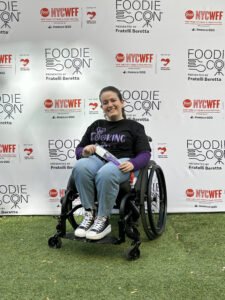
Gabby promotes her brand, Cooking on Wheels.
Gabby recommends finding tools and shortcuts that help make cooking less strenuous for you. Here are some ideas:
- If standing to prep food is tiring, sit down to do the chopping and mixing.
- Look for easy-to-hold kitchen tools from brands that specialize in ergonomic design, such as OXO.
- For wheelchair users, it can be difficult to get close to the stove with no knee space. Instead, use a portable cooktop on the kitchen table.
- If it’s difficult to lean over an oven, use a toaster oven on the countertop for baking and broiling.
- Expand your cooking repertoire with other small, countertop appliances, such as an air fryer or slow cooker.
Representing the disability community
Through her cooking, Gabby hopes to be an advocate for the disability community by demonstrating adaptive cooking techniques. Her dream job is hosting her own cooking-based talk show (à la Rachael Ray), where she would invite guests who have disabilities or work on disability-related projects.
Gabby wants to share her knowledge and enthusiasm for cooking with others. “My motto is, ‘Anyone can cook,’” she says.
Holiday Cooking Tips
The holidays are a special time for gathering with friends and family — usually around a meal. To handle the holiday cooking, Gabby teams up with her mom. They prepare as many dishes as possible in advance and freeze them.
Here are a few more strategies to make holiday food prep more fun and less stressful:
- Let others contribute to the meal. Ask guests what they are bringing so you can coordinate oven space, serving dishes, etc. You could also ask guests to bring a slow cooker and extension cord to help keep dishes warm.
- Guests who do not cook can contribute by bringing a store-bought fruit plate or dessert, ice, storage containers, or paper products.
- Forgo the fancy dinnerware and use paper plates and cups for easy clean up.
- Let guests assist with hosting. Assign tasks to friends and family members, such as attending the drinks counter, setting the table, cleaning the kitchen, and packing up leftovers.
Next Steps and Useful Resources
- Hack your Thanksgiving dinner prep with these accessible kitchen tools and hosting tips.
- Learn how some neuromuscular disease community members take the stress out of holiday entertaining.
- What is a healthy diet with a neuromuscular disease? We asked experts.
- Stay up to date on Quest content! Subscribe to Quest Magazine and Newsletter.
Disclaimer: No content on this site should ever be used as a substitute for direct medical advice from your doctor or other qualified clinician.


